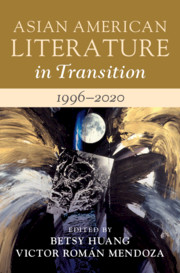Book contents
- Asian American Literature in Transition, 1996–2020
- Asian American Literature in Transition
- Asian American Literature in Transition, 1996–2020
- Copyright page
- Contents
- Illustrations
- Contributors
- Series Preface
- Acknowledgements
- Introduction
- Part I Neoimperialisms, Neoliberalisms, Necropolitics
- Part II Intersections, Intimacies
- Part III Genres, Modalities
- Part IV Movements, Speculations
- Chapter 13 Asian American Literary Studies and the Challenge of Utopia
- Chapter 14 What Is Asian America to Asians?
- Chapter 15 Mixed-Race Asian American Literature at the Turn into the Twenty-First Century
- Chapter 16 Global Asias
- Chapter 17 Finale; Or, Alternative Originaries
- Bibliography
- Index
Chapter 13 - Asian American Literary Studies and the Challenge of Utopia
from Part IV - Movements, Speculations
Published online by Cambridge University Press: 27 May 2021
- Asian American Literature in Transition, 1996–2020
- Asian American Literature in Transition
- Asian American Literature in Transition, 1996–2020
- Copyright page
- Contents
- Illustrations
- Contributors
- Series Preface
- Acknowledgements
- Introduction
- Part I Neoimperialisms, Neoliberalisms, Necropolitics
- Part II Intersections, Intimacies
- Part III Genres, Modalities
- Part IV Movements, Speculations
- Chapter 13 Asian American Literary Studies and the Challenge of Utopia
- Chapter 14 What Is Asian America to Asians?
- Chapter 15 Mixed-Race Asian American Literature at the Turn into the Twenty-First Century
- Chapter 16 Global Asias
- Chapter 17 Finale; Or, Alternative Originaries
- Bibliography
- Index
Summary
This chapter engages with Asian American utopian narrative forms as a heuristic for naming the contradictory subjects, spaces, and temporalities that emerge from competing visions of emancipation in the post-1990s period. In the wake of cultural nationalisms of earlier decades, and in a moment of neoliberal utopianism that hailed the end of the Cold War as the “achievement” of universal “Western liberal democracy,” women of color feminists critiqued cultural nationalism and the neoliberal utopian pursuit of a knowable subject and endpoint. The project of the liberal individual subject, they illuminate, elides racialized, gendered, and sexual difference for emancipatory projects. Demanding alternative accounts of freedom, Asian American feminists called for “subjectless” and “collective” politics. This chapter explores how this theoretical shift coincides with Asian American writers underscoring the paradoxes of utopian forms, as producing logics of domination and freedom. Through Sesshu Foster’s Atomik Aztex (2005) and Karen Tei Yamashita’s I Hotel (2010), this chapter rethinks Aztlán and the I-Hotel as galvanizing utopian forces for the Chicano and Asian American movements. Rather than abandoning utopia, Yamashita and Foster offer the utopian as a contradictory space to challenge the nationalist essentialisms of minority movements and the market individualism of neoliberal capitalism.
- Type
- Chapter
- Information
- Asian American Literature in Transition, 1996–2020 , pp. 255 - 276Publisher: Cambridge University PressPrint publication year: 2021

